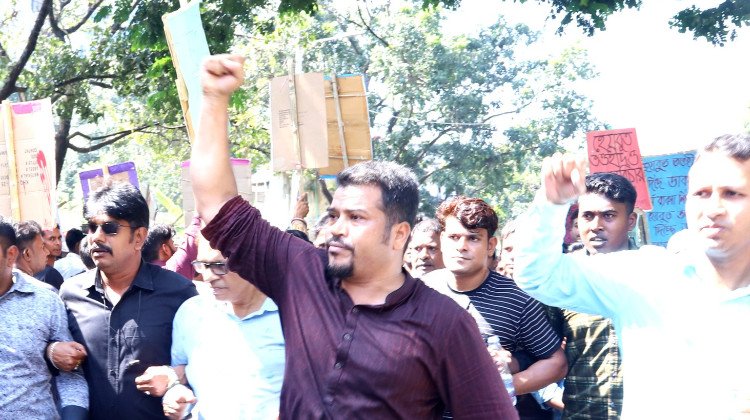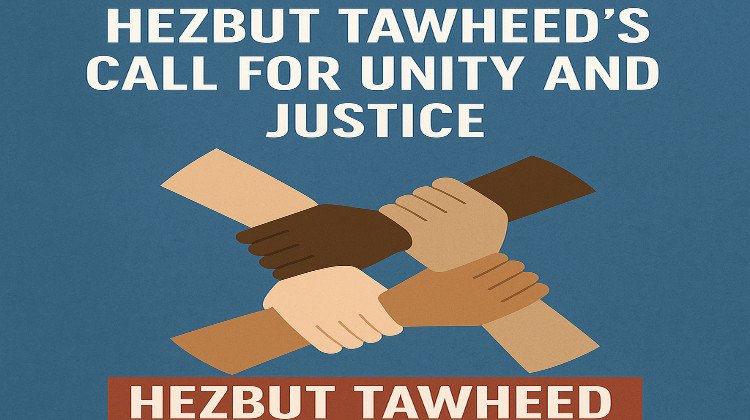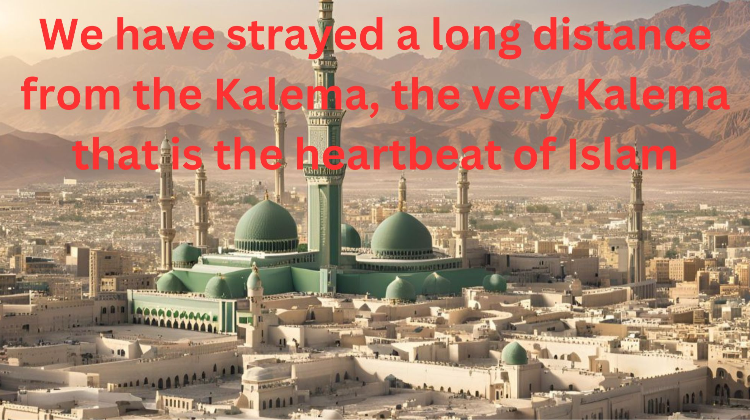Hezbut Tawheed in Defense of Workers' Rights
Category :
Ideology

Author ::
Salzar Rahman Sabu
Feb 27, 2026
visibility
548 Read
“May 1st” is observed globally as International Workers’ Day. Every year, people across the world commemorate this day to promote and protect the rights of working-class people.
On this day, national and international figures and organizations highlight the problems and demands of workers and call for the protection of their rights. Disadvantaged laborers march in rallies with placards and festoons in major cities to demand their rightful dues.
Particularly, leftist organizations are noticeably vocal in this regard. These awareness campaigns and efforts to defend workers’ rights are commendable—but unfortunately, they are often limited to this single day. For the rest of the year, few stand beside the laboring class.
Yet, from the dawn of human civilization, it is on the backs of these very laborers that society has developed—cities, ports, and civilization have risen because of them. People have progressed, destinies have changed, but the fate of these hardworking people has not.
In 1886, laborers had to give their lives in Chicago to fight for their rights. Shockingly, even in the 21st century, they still must struggle for what is rightfully theirs.
Over the past 150 years, humanity has reached the pinnacle of material progress, but has spiritually deteriorated. As a result, the working class still suffers under ruthless exploitation, more oppressed, deprived, and persecuted than ever.
Fourteen hundred years ago, the Prophet of Allah (peace be upon him) established a noble Islamic way of life in the Arabian Peninsula. In his society, there was no discrimination between the strong and the weak, or the elite and the commoners.
The relationship between employers and workers was like that of brothers. Justice and fairness were so deeply rooted that even the Caliph could be questioned in public and had to be accountable. In such a society built on fairness, workers could never be denied their wages or rights. They were united under a common ideology and brotherhood.
In his Farewell Sermon, the Prophet (peace be upon him) said, “Your laborers are your brothers. Allah has placed them under your care. So, feed them what you eat, clothe them with what you wear, and do not burden them beyond their capacity. If you must do so, then help them” (Bukhari 5617). Regarding wages, he emphasized, “Pay the worker before his sweat dries” (Ibn Majah 24430).
Tragically, the great values Islam established for the dignity of labor are no longer practiced in the Muslim world. Muslims today have abandoned this just system and instead follow Western ideologies and laws. Since human-made systems can never be perfect or balanced, these adopted models fail to ensure justice and peace.
Rejecting Allah’s prescribed way of life, Muslims have fallen behind in all fields—science, economy, and beyond. They face economic crises, invasions, and oppression from imperial powers, but cannot resist.
.
In these troubled times, Hezbut Tawheed has emerged as a movement to revive the lost ideals of Islam from 1400 years ago. Under the leadership of its Imam, Hossain Mohammad Selim, Hezbut Tawheed is rapidly advancing this revival. He has brought Islam off the pages of books and into practical life. To witness its real-world manifestation, one must visit Sonaimuri in Noakhali, his hometown.
Just five years ago, this village was backward and neglected. Roads were broken, there were no hospitals or good schools, and the youth suffered from unemployment and poverty. Crime, extortion, and gang activity were rampant. But under the guidance of the honorable Imam, a quiet revolution has unfolded.
Through the Chashirhat Unnayan Parishad (Farmers’ Market Development Council), over 50 projects have been initiated—modern cattle and dairy farms, feed mills, poultry, and goat farms. Currently, 26 workers are employed in the farms, supporting 104 family members.
They also operate a massive fish farming project yielding 75,000 kg of fish in just one year, cultivate paddy and seasonal crops on 60 bighas of land, and run a restaurant using farm produce. A garments factory named “Karorani Fashions” and a food processing unit “Karorani Foods Ltd.” have been set up, alongside 50 small businesses to support small investors.
Hundreds of workers, many of them Hezbut Tawheed members, are employed—not treated as subordinates, but as equals. It’s difficult to distinguish owner from worker. After Friday prayers, the Imam inquires about workers’ problems—food, shelter, or healthcare—and resolves them instantly. He eats with them during Ramadan, delivers Eid gifts to their homes, and ensures festival bonuses.
To solve housing issues, multiple buildings are being constructed. The Imam has also established Nurul Haque High School to provide both academic and technical education to children. A college is also underway. A mosque for spiritual growth and a clinic for healthcare have been built, with plans for a hospital.
Nutritious and chemical-free food is being ensured through fish and vegetable farming. Most importantly, no worker’s wage is ever delayed. Unlike most institutions, here they receive their full payment on time and return home happy. The policy of paying before sweat dries is strictly upheld.
Through such revolutionary transformation, Hezbut Tawheed is reshaping Chashirhat Union with the true teachings of Islam.
Regarding May Day, the honorable Imam says, “May Day is observed for the liberation of the working class, but we have not seen the actual implementation of global human rights declarations. However, if humanity accepts the divine system and upholds the standards set by Allah as His vicegerents on Earth, then everyone's rights will be protected.
No worker will have to bleed on the streets like in Chicago, or demand rights through rallies. In our garments factory, workers labor with joy. Even on Eid, we celebrate together with their families—a unity only possible under Islamic consciousness. There is no divide between owner and worker. We are building this unique example in Chashirhat, Sonaimuri, Noakhali.
Images Related to this Post
Search
Popular Post
Recent Post
Tags
Hezbut_Tawheed
Imam Hossain Mohammad Salim
Bangladesh Violence
Religious Extremism
Mob Attacks
Human Rights Violations
Minority Persecution
Rangpur Attacks
Jamaat-E-Islami
Hefazat-E-Islam
Tawheed
Muslim Ummah
Islamic Unity
Shirk
Kufr
Islamic Revival
Kalima-E-Tawheed
Obedience To Allah
Deen-Ul-Haq
Hizb-Ut-Tawheed
Ram Temple
Third Temple
Ayodhya
Jerusalem
Religious Politics
Babri Masjid
Al-Aqsa
Zionism
Hindutva
Netanyahu
Religious Hate
Muslim Unity
Noakhali Conference
Imam Salim
Islamic Movement
Shahidi Jame Mosque
Ht Members Conference
Bangladesh Religious Persecution
Islamic Reform Movement
Extremist Violence
Human Rights Bangladesh
Sonaimuri Noakhali Attack
Political Extremism Bangladesh
Faith-Based Violence
Eid Al‑Fitr
Zakat Al‑Fitr
Ramadan Charity
Islamic Social Justice
Community Harmony
Bangladesh Poverty
Islamic Economy
Sadaqah
Fitrana
Eid Unity
Arab History
Islamic Governance
Caliph Umar
Social Transformation
Women’s Rights In Islam
Justice In Islam
Political Systems
Islam Vs Democracy
Islam And Knowledge
Islamic System
Prophet Muhammad
Farewell Sermon
Hajj
Global Peace
Human Rights In Islam
Dhul-Hijjah
Arafat Sermon
Islam Vs Un Charter
Unemployment In Bangladesh
Education System Failure
Educated Unemployment
Jobless Graduates
British Education Legacy
Youth Crisis
Hezbut Tawheed Views
Bids Report
Ssc To Masters Job Race
Middle Class Dilemma
Kerani Mentality
Excessiveness In Religion
Religious Distortion
Overinterpretation Of Islam
Misguided Enthusiasm
Warnings Of The Prophet
True Islam
Spiritual Clarity
Abandoning The Mission
Chormonai Pir
Desherpotro
Islamic Reform
Persecution In Bangladesh
Religious Violence
Jamaat-E-Islami Attacks
Islamic Truth Movement
Women And Knowledge
Islamic Feminism
Gender Roles
Social Awareness
Muslim Women
Female Empowerment
Islamic History
Qur’anic Guidelines
Obeying Allah’s Commands
Islam And Suffering
Workers' Rights In Islam
Labor Justice
May Day Islam
Islamic Society Model
Chashirhat Development
Imam Hossain Mohammad Selim
Islamic Brotherhood
Fair Wages
Islamic Military Strategy
Tawheed-Based State
National Security
Qur’anic Warfare
Mujahideen
Peacekeeping
Modern Islamic Army
Military Training
Ummah Defense
Sharia Governance
Southasia
Extremism
Bangladesh
India
Pakistan
Myanmar
Jihad
Islamophobia
Radicalism
Resistance
Conflict
War
Terrorism
Proxywar
Bjp
Hasina
Ghazwa
Kashmir
Rohingya
Arsa
Militancy
Ideology
Unity
Awareness
Injustice
Arms
Geopolitics
Gaza
Hypocrisy
Taliban
Alqaeda
Afghanistan
Syria
Iraq
America
China
Russia
Media
Violence
Oppression
Nationalism
Muslim
Islam
Justice
Youth
Leadership
Sovereignty
Hezbuttawheed
Mosque
Governance
Society
Administration
Education
Military
Economy
Women
Culture
Law
Quran
Hadith
Prayer
Madinah
Baytalmal
Amir
Discipline
Khutba
Transparency
Spirituality
Training
Morality
Ummah
Prophet
Sharia
Community
Peace
Development
Security
National
Khutbah
Sabr
Zakat
Sufism
Equality
Mosquesystem
Participation
Aqiqah
Accountability
Tradition
Modernity
Ummati Muhammad
Unity In Islam
Sunnah
Islamic Teachings
Muslim World
Deen Of Islam
Security Crisis
National Unity
Political Unrest
Military Vulnerabilities
Strength
Solidarity
Disunity
Muslim Nations
Women's Rights
Rufaidah Panni
Eid Congregation
Islamic Women Empowerment
Social Justice
Equality In Islam
Momen
Kafir
Mushrik
Allah's Laws
Faith In Islam
Belief In Allah
True Believers
Kalimah
Shariah
Justice And Peace
Political Parties
Multiparty Democracy
Political Factionalism
Islamic Political System
Democracy Vs Islam
Secularism
Political Ideologies
Islamic Law
Political Vision
Governance Without Parties
Political Stability
Islamic State
Shura System
Islamic Perspective
Women’s Reform Commission
Family Law
Inheritance Law
Labor Recognition
Shariah Law
Gender Equality
Religious Opposition
Feminist Movement
Human Rights
Political Debat
Arab Society
Islamic Economic Justice
Military Transformation
Education In Islam
Judicial Independence
Accountability In Islam
Islam And Democracy
Societal Transformation
Governance Systems
Surah Yaseen
Islamic Guidance
Religious Work
Misguidance
Imam Role
Religious Commercialization
Truth And Falsehood
Religion And Society
Quranic Teachings
Ethical Leadership
Spiritual Struggle
Religious Scholars
Religious Corruption
Quranic Verses
Islamic Scholars
Prophet Muhammad (S.a.w)
Military Nation Of Islam
Sahabah
Lost Legacy
Ummah Of Muhammad
Jehad
Qetal
Islam And Violence
Islamic Leadership
State Vs Individual Struggle
Allah's Help
Islamic Reflection
Divine Support
Muslim World Crisis
Quran Teachings
Islamic Awakening
Qurbani
Bangladesh Politics
Eid Ul Adha
Islamic Sacrifice
Bangladesh Crisis
Global Conspiracy
Sacrifice
Labour Rights
Employment Crisis
Bangladesh Economy
Wage Gap
Inflation
Unemployment
Education Reform
Job Creation
Income Inequality
Post-Pandemic Economy
Eid-Ul-Azha 2025
Bangladesh Eid Congregation
Eid Prayer 2025
Women's Participation
Peace & Justice
Bangladesh Religious Events
Eid-Ul-Azha Message
Khilafah
Global Oppression
Islamic Festivals
Quranic Guidance
Spiritual Sacrifice
Ibrahim's Sacrifice
Eid Mubarak
Peace Through Tawheed
Women's Reform Debate
Bangladesh Women's Rights
Hezbut Tawheed Position
Islamic View On Women's Rights
Legal Reforms Bangladesh
Family Law Reform
Inheritance Rights
Sharia Law Bangladesh
Women's Equality
Western Influence
Religious Groups Debate
Gender Equality Islam
Islamic Social Solutions
Women's Dignity In Islam
Islamic Solutions
Beyond Politics
Labor Rights
Class Struggle
Economic Solutions
May Day Analysis
Economic Justice
Divine Accountability
Global Economic Crisis
Capitalism Vs Islam
Socialism Vs Islam
Savar Attack
Ishwardi Attack
Religious Fanaticism
Political Manipulation
Islamic Extremism
Government Response
Democratic Threats
Islamic Teachings Misuse
Radical Ideology
Communal Conflict
Radical Groups In Bangladesh
Terrorism In Bangladesh
Islamic Rights
Mosque Access
Eid Prayer
Muslim Women Empowerment
Prophet Muhammad Teachings
Women In Mosques
Women Rights In Islam
Gender Equality In Islam
Masjid An-Nabawi
Women's Role In Islam
Misconceptions About Women
Women Participation In Mosque
Eid Khutbah 2025
Islamic Sermon
Hossain Mohammad Selim
Bangladesh Eid
Qurbani Meaning
Women In Islam
Rufaydah Panni
Islamic Congregation
Female Participation In Eid
Chashirhat Eid
Palestine Solidarity
Eid Prayer Bangladesh
Women In Eid
Kushtia Rally
Gaza Crisis
Muslim Persecution
Bangladesh News
Peace Movement
Humanity
Divine Law
Social Reform
Religious Harmony
Truth
Call To Action
Palestine
Dajjal
Islamic Struggle
Mohammad Bayazid Khan Panni
Genocide
Oic
Protest
National Press Club
Rangpur Attack
Religious Reform
Karwan Bazar Protest
Terrorist Attack
Law And Order Failure
Emamht
Ht_In_Brief
Pabnaattack
Justiceforvictims
Humanchain
Politicalviolence
Legalreform
Endimpunity
Bangladeshjustice
Hezbuttawheedleaders
Demandjustice
Pabnapressconference
Policeinaction
Proposedgovernancesystem
Islamicstatesystem
Allahslaw
Economicreform
Educationreform
Capitalismcritique
Dhakaevent
Purposeofcreation
Humancreation
Khalifah
Allahsplan
Divineguidance
Adamsstory
Islamicteachings
Peaceandjustice
Sovereigntyofallah
Lailahaillallah
Islamiccreed
Aqidah
Islamicfaith
Iman
Deen
Peaceinislam
Purposeofislam
Beliefsystem
Faithandworship
Why
Escalate
Mohammad Bayazeed Khan Panni
Hossain Mohammad Salim
Religious
Extremist
Interfaith
Situation
Ultimatum
Threats
Extremist Attack
Attack
Movement
Barakat Hossain Osama
United Kingdom
Conservative Party
Donald Trump
Secular Leadership
Fanatical Populace
Fanatical
Populace
Religion
Extensive Damage
Catastrophic Flooding
High School
Urgent Help Needed
Devastated
Allah
Modus Operandi
Messenger
Believer
Messenger Of Allah
People
Human
Jame Mosque
A Cornerstone
Cornerstone
A Just Society
The Establishment
Establishment
History
Messenger Muhammad
Simple And Straightforward
Who Made
The Simple
Complex
Way Of Life
Jannah
Way To Jannah
Civilization
Religious Figures
Survive
Politics
Worship
Establish
Goals And Objectives
System Of Life
Money
Tolerance
Madness
Mo'men
Today’s
Educated
Needs
Corruption
British
Government
Democracy
Communism
Socialism
Political
Secular Education
Responsible
The Reign
Hindu
Terrifying
Slavery
Jewish Conspiracy
The Protocols Of The Elders Of Zion
Politician
Give And Take
Education System
European
Population
Mentality
Slave
Preface
Children
The Quran
The Miracle
Creator
The Creator
Creation Of Man
The Creation Of Man
Premise
First Words
Aqida
The Programme
The Messenger
Mankind
Actual
Concept Of Islam
Crossroads
Mojeza
The Call
Panni
The Author
Qur'an
Process
The Process
A Person
Tabook
The Special Three
Special
The Tabook
The Ahzab
Ahzab
Khandak
The Uhud
Uhud
The Badr
Badr
Ebadat
Ma'bud
Vicegerent
Worshipper
Aqaed
The Reasons
Reasons
Reason
Adam
Eblis
Khalifa
Angels
Adam And Eve
Adam And Hawa










Leave a Comment